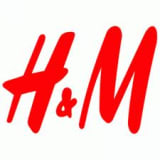
H&M
About
Founded in 1947, H&M is a global fashion brand offering a varied assortment of clothing, including concepts for ladies, men, teenagers and children with over 2300 stores in 40 plus markets. The H&M Group’s business consists mainly of sales of clothing, accessories, footwear, cosmetics and home textiles to consumers. H&M has grown significantly through the years and now has 94,000 employees.
In addition to H&M and H&M Home, the H&M Group includes the brands COS, Monki, Weekday and Cheap Monday.H&M’s business concept is to offer fashion and quality at the best price. H&M is a design-driven innovative and responsible fashion company based on strong values that is growing all over the world while maintaining quality, sustainability and high profitability. H&M’s principle for expansion is that every store shall have the bestcommercial location.
The business is operated from leased store premises, through online and catalogue sales and on a franchise basis.At the end of the financial year H&M was present in 43 markets; eleven of these are operated on a franchise basis. The total number of stores at the end of the 2011 financial year was 2,472 including 70 franchise stores, 45 COS stores, 52 Monki stores, 19 Weekday stores and 4 Cheap Monday stores. Online and catalogue sales are offered in Sweden, Norway, Denmark, Finland, the Netherlands, Germany, Austria and the UK.
The home textiles range, H&M Home, is sold via online and catalogue sales and also through stores in for example Stockholm, Helsinki, Copenhagen, London, Amsterdam, Oslo and Frankfurt. Online sales for COS and Monki began in 18 countries in autumn 2011.
Sustainability
H&M is actively involved in the Better Cotton Initiative (BCI). The BCI is a long-term multistakeholder initiative that develops and promotes good farm practices, allowing more cotton to be grown while reducing water and chemical use and protecting both working conditions and biodiversity.
The system has established minimum environmental and social requirements for cotton growing. The BCI is not a labelling scheme, nor will it provide Fairtrade or organic cotton. It aims to make all cotton more sustainable. It is a multistakeholder initiative that includes NGOs like WWF, clothing companies, cotton producer groups and trade and industry bodies.
Company Offices
- Sweden (headquarters)
- Stockholm
- Mäster Samuelsgatan 46A